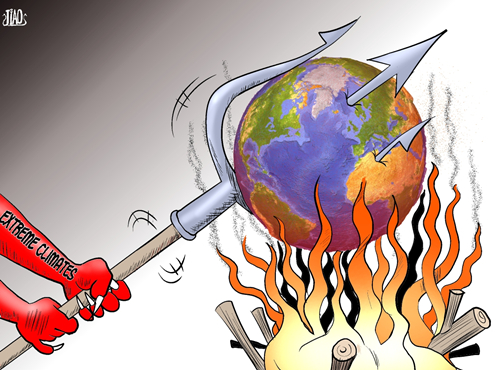Evolving in the face of global challenges
- By Jarrett Wilde
 0 Comment(s)
0 Comment(s) Print
Print E-mail China.org.cn, July 14, 2012
E-mail China.org.cn, July 14, 2012
|
|
|
Global warming [By Jiao Haiyang/China.org.cn] |
The issue of climate change has risen rapidly in prominence to become one of contemporary society's most crucial, and widely debated issues. Some of the results of climate change include, but are not limited to, ocean stagnation, the melting of the arctic ice sheets, rising sea levels and the drowning of coastal cities, the extinction of many of the planet's living species, and the rise in frequency and destructive capabilities of natural disasters, specifically those which are weather-related, such as hurricanes, drought, and sandstorms. British astrophysicist Stephen Hawking has gone so far as to suggest that if climate change continues, "the worst case scenario is that Earth would become like its sister planet, Venus, with a temperature of 250 centigrade and raining sulfuric acid." All in all, it's a pretty grim picture.
Climate change is the defining issue of a new era in human civilization. Although the rhetoric of climate change often implies an 'end' (for instance, the end of our and many other species, the end of life as we know it, the end of balance in our natural systems), the real implications behind climate change discourse are of a new beginning, a new understanding of the world we live in and our relationship to it, a new understanding of who we are and what we need to do, a new human consciousness, a species consciousness.
For a long time, humans have created identity through a process of "othering;" as French philosopher Jean-Paul Sartre puts it: "The man who becomes aware of himself through the cognito also perceives all others, and he perceives them as the condition of his own existence. He realizes that he cannot be anything…unless others recognize it as such. In order to get any truth about myself, I must have contact with another person. The other is indispensible to my own existence, as well as to my knowledge about myself." Humans have created a world of intersubjectivity "in which man decides what he is and what others are."
Up until the closing years of the twentieth century this world of intersubjectivity has manifested itself macrocosmically as a community of nation states. We went through a meticulous process of physically dividing the world, literally drawing lines on a map, then labeling, recognizing and identifying each territory as a specific isolated entity with its own specific circumstances, conditions, problems, and interests. Through the principle of sovereignty, all-powerful state governments were allocated full responsibility for dealing with the conditions of their respective territories and populations; however, they were given absolutely no jurisdiction outside their borders. Beyond those borders, these states existed in a lawless "state of nature."
The implications of climate change go well beyond traditional state borders and trump the authority of sovereign governments, showing us that the state of nature is not lawless, that it is subject to the laws of nature; that greed, gluttony, and self-interest are not consequence-free; that regardless of how much effort we put into drawing accurate lines along the globe, we are ultimately not only inseparable from each other, but also inseparable from the world we live in by virtue of being human. Climate change has led us to perceive the environment as a condition of our existence, it has forced us to re-conceptualize our identity and seek recognition for our species from nature; it has presented our species with not only a challenge, but also an opportunity: To reinvent ourselves, our identity as a species, and our civilization.
Climate change is the defining issue of the twenty-first century because to meet the challenges it presents, we have had to think and act beyond the paradigms of the traditional state system. More than one million environmental, social justice and indigenous organizations have been established ; all working together to come up with solutions to satisfy our energy needs and create a sustainable society. Last month, the Rio Earth Summit took place in Rio de Janeiro, providing a forum for discussions and negotiations which included a wide variety of states, NGOs, workers and trade unions, farmers, local authorities, business and industry, science and technology communities, women's groups and children and youth . Climate change has become the foundation of the greatest collaboration in human history.
Climate change is, however, not the only issue on the board for this new era. There are a number of issues that we humans have become aware of and are now trying to tackle, including epidemics, small arms proliferation, international drug trafficking, the trafficking of children, and human rights infringements. But we are stepping up our efforts and by reaching out to a variety of actors, we have stopped the production, trade and use of antipersonnel land mines and cluster munitions. We have also established an international criminal court to prosecute crimes against humanity, and four out of five children on the planet now have access to education.
Today, via advancements in information and communication technologies we are more connected to each other and to the database of human knowledge than we have ever been. At no other time in human history have we shown such a willingness to come together and take an active role in determining the conditions of our own existence. What an exciting time to be human!
The author is a Canadian currently studying the Chinese program at Tsinghua University and is now working on his Master's thesis.
Opinion articles reflect the views of their authors, not necessarily those of China.org.cn.







Go to Forum >>0 Comment(s)